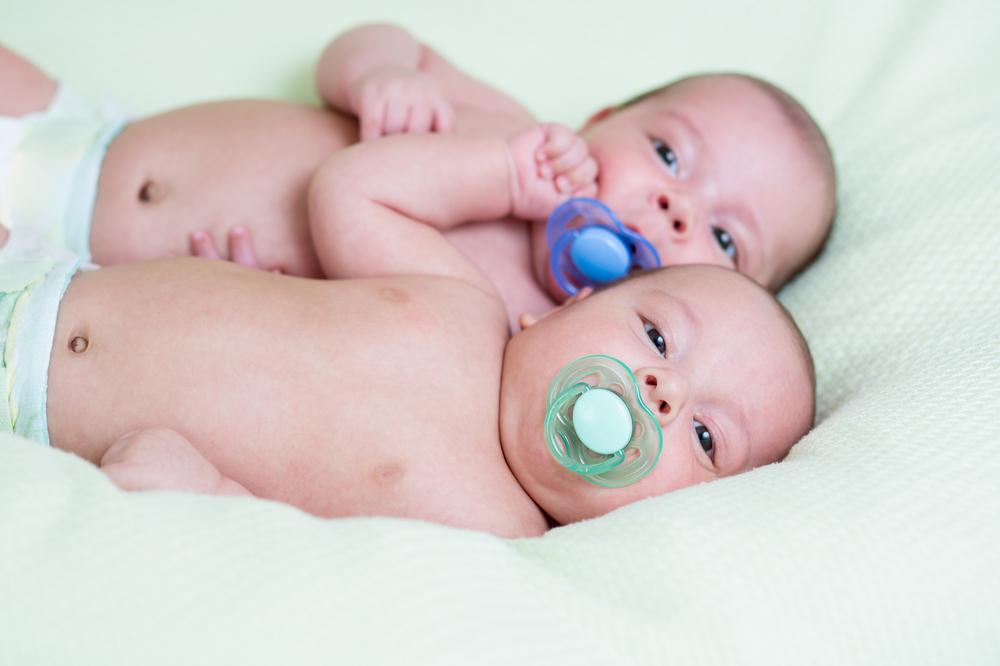On the parenting website Babble, an expecting mom and dad have written a pair of essays about how, after two years of fertility calendars, intrauterine inseminations, and in vitro fertilization, they are now pregnant with twins. Actually, the essays are about how they are not elated. In fact, they are “terrified” (her words) and “pissed” (his). Mom and Dad had hoped to give their 3-year-old son a younger sibling, but they had not hoped to give him two.
“The twins are coming fast, and I don’t feel a sense of joy,” Mom writes. “We are not rich. We work hard to provide a good life for our son, and we have dreams, as all families do, of going to Disney, college, etc. I worry about how much of our attention and resources will be taken away from our firstborn.” Their distress was compounded by the fact that everyone around them saw their twins-to-be as a positive development. The couple’s own doctor announced the possibility of two viable fetuses as “good news.”
The couple wrote the essays under pseudonyms to protect themselves and their (unwanted) children from the Internet storm that was about to rain down on them. And rain it did: Commenters flocked to the pieces to inform the parents that they should feel blessed to have gotten pregnant under any circumstances. After all, many couples struggle for years to conceive without success. Some become pregnant only to miscarry. This couple invested a lot of time, money, and effort in order to bring another kid into the world, and now they’re dissatisfied with their exceptional luck. Well: “Boo fucking hoo,” as one commenter put it.
The easy response is to say that this couple needs an attitude adjustment (or professional help: Prenatal depression is as common as postnatal depression, and the couple is currently in therapy to address its issues). But their story speaks to how unsettling an unexpected child can be, even if its parents have the means to plan—even engineer—a pregnancy.
We tend to think of unplanned pregnancies on a sliding moral scale. The social acceptability of not feeling overjoyed about bringing a new life into the world shifts depending on the prospective parents’ perceived reproductive agency. Abortions are more accepted when the woman had no choice in becoming pregnant (as in the case of rape exemptions) or when she has little choice but to terminate (when carrying the pregnancy to term threatens her life). Less socially acceptable—but still understandable—are abortions undertaken by very young or very poor parents, for whom raising children would constitute an exceptional struggle. Then there are those couples that don’t want to have children that they can’t afford to take to Disneyland. Those people are dismissed as monsters.
Somewhere in the middle are the well-to-do parents who go to great lengths to conceive, only to find themselves pregnant with triplets, quadruplets, or more. Because these IVF-induced megapregnancies are risky, it’s common to surgically eliminate some of the fetuses to improve the chances of the others. There’s even a pleasant euphemism, “selective reduction,” to normalize the procedure as an acceptable choice on the reproductive menu. But that pass ends at twins. Reducing twins to a single fetus is a controversial choice because, as Ruth Padawer’s 2011 New York Times Magazine piece on the phenomenon explains, twins aren’t seen as risky enough to mom and baby to medically justify eliminating one of the two fetuses. Eliminating one fetus to save two others is an understandable decision, but eliminating one out of two gets into Sophie’s Choice territory.
It doesn’t help that, culturally, twins are perceived as a rare gift, what Padawer calls “the idealized notion of twins as lifelong soul mates.” Those who do make the choice rarely discuss it. As Padawer notes, “secrecy is common among women undergoing reduction to a singleton. Doctors who perform the procedure, aware of the stigma, tell patients to be cautious about revealing their decision.” Some women “are so afraid of being treated with disdain that they withhold this information from the obstetrician who will deliver their child.”
Babble’s anonymous couple “considered a reduction for about 30 seconds,” Dad says, but ultimately decided the procedure was too “Machiavellian” to undertake without reason. Still, they privately hoped that doctors would locate some socially acceptable justification for them to undergo a reduction, like genetic anomalies in the twins. Sadly, “none came.” That sounds exceptionally crass, but the depth of desperation buried in that thought process is instructive. The culture of silence around this issue means that people aren’t even aware of all the reproductive choices they’ll have to make until they’re visible on the sonogram. This couple has been shamed for airing their unpopular feelings for all to read, but they’ve done a service to prospective parents who are weighing their own options—and may now have a better idea of what they’re in for.
